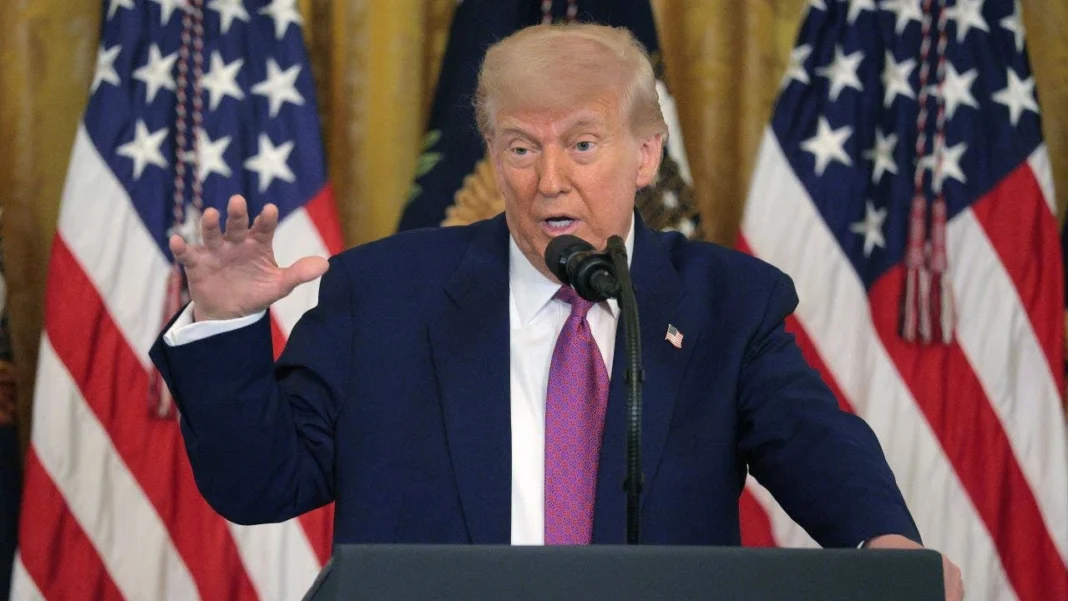Trump struck at two opponents – California and Elon Musk – by dismantling EV standards through resolutions that block the state’s ambitious plan to phase out gasoline-powered vehicles by 2035. The former president signed congressional measures that eliminate California’s mandate requiring all new cars sold in the state to be emission-free within the next decade. The decision has rippled beyond California, affecting seventeen other states that represent 30% of the U.S. vehicle market and had adopted similar electric vehicle standards. The resolutions also canceled California’s requirement that half of all new trucks sold must be electric by 2035. California’s original plan had set clear targets: 35% of new cars sold needed to be emission-free by 2026, with an increase to 68% by 2030. Transportation’s role as the largest emission source in the United States, accounting for 28% of all greenhouse gas emissions, makes this rollback particularly significant. California’s officials reacted swiftly – the state’s attorney general announced a lawsuit even before the signing ceremony ended.
Trump Overturns California EV Mandate With Congressional Resolutions
Image Source: Fox News
“”We officially rescue the U.S. auto industry from destruction by terminating the California electric vehicle mandate once and for all.”” — Donald J. Trump, 45th and 47th President of the United States
Donald Trump signed three congressional resolutions on June 12, 2025. The move officially stripped California of its power to set its own vehicle emission standards. “We officially rescue the U.S. auto industry from destruction by terminating the California electric vehicle mandate once and for all,” Trump declared at the White House signing ceremony.
What the resolutions repeal and why they matter
These resolutions target three crucial environmental regulations. They nullify California’s landmark Advanced Clean Cars II rule that would have made car manufacturers sell more zero-emission vehicles – starting at 35% in 2026 and banning all new gas-only vehicles by 2035. The second resolution cancels the Advanced Clean Trucks rule requiring half of all new trucks sold in California to be zero-emission by 2035. The third one overturns the Heavy-Duty Engine and Vehicle Omnibus rule that set cleaner engine standards for heavy-duty vehicles.
This radical alteration in U.S. environmental policy comes with strong opinions. Trump believes these regulations would “raise car prices, hobble American car companies and place an incredible strain on electrical grids across the country”. He called the EV mandate “a horrible scheme” that would “effectively abolish the internal combustion engine, which most people prefer”.
How the Congressional Review Act was used
The Trump administration used the Congressional Review Act (CRA), a 29-year-old law that lets Congress overturn executive branch rules through a simple majority vote. The move sparked controversy. The nonpartisan Senate parliamentarian and the Government Accountability Office ruled that lawmakers couldn’t legally revoke California’s waivers using this mechanism.
Senate Republicans pushed ahead with the votes in May 2025 despite these objections. The resolution against California’s Advanced Clean Cars II regulation passed with a 51-44 vote, with just one Democrat siding with the Republicans.
Which states are affected beyond California
These changes reach far beyond California. Before these resolutions, 11 other states had adopted California’s electric vehicle standards. California and these states make up about 30% of the U.S. vehicle market. Some reports suggest up to 17 states, representing 40% of the U.S. auto market, had adopted parts of California’s clean car standards.
California took swift legal action. Attorney General Rob Bonta led a group of 10 states to file a lawsuit challenging the CRA’s use in overturning these waivers. Governor Gavin Newsom responded by signing an executive order that directs state officials to find other ways toward electrification.
California Sues Trump Administration Over EV Rollback
Image Source: Fox Business
California and 10 other states quickly filed a lawsuit after Trump dismantled California’s emissions regulations. They challenged the legality of using the Congressional Review Act to overturn clean air policies. The legal action wants to protect California’s right to set its own vehicle emission standards that remain vital to the state’s climate strategy.
Newsom and Bonta lead legal challenge
Governor Gavin Newsom and Attorney General Rob Bonta led the charge by filing suit in federal district court for northern California. “Trump’s all-out assault on California continues – and this time he’s destroying our clean air and America’s global competitiveness in the process,” Newsom stated. The coalition has Colorado, Delaware, Massachusetts, New Jersey, New Mexico, New York, Oregon, Rhode Island, Vermont, and Washington. Bonta declared, “California will not back down. We will continue to fiercely defend ourselves from this lawless federal overreach”. Newsom also issued an executive order that directs the Air Resources Board to craft another mandate to either strengthen or replace existing rules.
States’ rights vs federal overreach
Constitutional arguments about states’ rights sit at the lawsuit’s core. The legal filing argues the “Federal Government carried out an illegal playbook designed to evade lawful procedures” and “ran roughshod over federalism and separation of powers principles”. Colorado Attorney General Phil Weiser called the action “an assault on the authority of states, like Colorado, to adopt stronger tailpipe pollution limits than those set by the federal government”. Trump managed to keep his position, stating “Our Constitution does not allow one State special status to create standards that limit consumer choice”.
EPA waiver history and legal precedent
The EPA granted California more than 100 waivers for its clean air and climate efforts since the Clean Air Act’s adoption in 1970. No waiver has ever faced revocation, and no process exists to do so. Senate Republicans rejected the Government Accountability Office’s March conclusion that stated the waivers cannot be repealed under the Congressional Review Act. California showed its standards were feasible by giving manufacturers enough time to develop compliant technology. The EPA called the lawsuit “nothing more than California throwing a temper tantrum” and responded that it “lacked merit”.
Trump Targets Elon Musk Amid EV Policy Reversal
Image Source: Times of India
The alliance between President Trump and Elon Musk has crumbled because of the EV policy reversal. This breakdown shows how business interests and politics intertwine in complex ways.
How Musk’s role in DOGE unraveled
Musk wrapped up his stint at the Department of Government Efficiency (DOGE) on May 30, 2025. His 130-day term as a special government employee came to an end. He promised savings of USD 2.00 trillion, but DOGE managed to save only USD 175.00 billion—nowhere near Musk’s adjusted USD 1.00 trillion goal. Things started going south when Musk openly attacked Trump’s “One Big Beautiful Bill Act.” He called it a “disgusting abomination” and said it “undermines the work that the DOGE team is doing”. The bill’s removal of EV tax credits could cost Tesla USD 1.20 billion.
Trump’s comments on Tesla and Musk
Trump didn’t hold back his frustration. “I’m very disappointed in Elon. I’ve helped Elon a lot,” he told reporters. The president shared a revealing detail about their friendship’s breaking point: “I was surprised Musk endorsed me given my efforts to block states from phasing out gasoline-powered vehicles”. Trump then issued a warning: “The easiest way to save money in our Budget, Billions and Billions of Dollars, is to terminate Elon’s Governmental Subsidies and Contracts”. The president did acknowledge Musk’s practical stance on the EV mandate rollback: “[Musk] said, ‘well, as long as it’s happening to everybody, I’ll be able to compete.’ It’s very interesting. I thought it was a very honest answer”.
Impact on Tesla and EV market perception
Tesla’s stock took a massive hit after the public spat, dropping 14% and losing USD 150.00 billion—marking the company’s biggest single-day decline. The stock bounced back 5% the next day, but analysts warned about the long-term effects. JPMorgan’s Ryan Brinkman pointed out that Trump’s policies could threaten over half of Tesla’s 2025 profits. Dan Ives from Wedbush stayed positive: “Musk needs Trump and Trump needs Musk for many reasons, and these two becoming friends again will be a huge relief for Tesla shares”. Musk later backed down with a post: “I regret some of my posts about President @realDonaldTrump last week. They went too far”.
Automakers, Environmentalists, and Industry React to Policy Shift
Image Source: CalMatters
The auto industry stakeholders stand divided over President Trump’s rollback of California’s electric vehicle mandates. Their opposing views reflect a deeper split about America’s transportation future.
Automaker support for a unified national standard
The repeal of California’s EV requirements received strong backing from major automakers. John Bozzella, CEO of the Alliance for Automotive Innovation representing Detroit’s Big Three and other manufacturers, claimed: “Everyone agreed these EV sales mandates were never achievable and wildly unrealistic”. The mandates would have been “harmful to auto affordability, to consumer choice, to industry competitiveness and to economic activity,” Bozzella added. The alliance praised Trump’s action “before the EV mandates did real damage to the auto industry in America”. Stellantis announced its readiness “to adapt to the policy changes” while Ford and GM stayed silent on the changes.
Environmental groups warn of climate setbacks
Environmental organizations strongly opposed this policy reversal. Simon Mui of the Natural Resources Defense Council claimed: “California’s vehicle standards reduce costs for drivers, increase customer choice, boost domestic manufacturing, improve air quality, and help address the climate crisis”. The American Lung Association saw the decision as “a major blow to the decades-long public health protections delivered under the Clean Air Act”. Dan Becker from the Center for Biological Diversity’s Safe Climate Transport Campaign put it bluntly: “Trump and his congressional allies have declared war on the environment”.
Oil industry and trade associations applaud move
The petroleum sector welcomed this fundamental change. The American Petroleum Institute and American Fuel & Petrochemical Manufacturers released a joint statement that called the signing “a major win for the American people”. Chris Spear, American Trucking Associations’ president, supported ending California’s electric truck policy as “common sense.” He pointed to infrastructure limitations making the transition timeline unrealistic. “We looked at this as a mad dash to zero,” Spear noted. The oil industry maintained its opposition to California’s standards, arguing they would “produce widespread effects on the national economy”.
The Transformation of U.S. Automotive Regulation
Trump’s dismantling of California’s green car rules stands as one of the most important turning points in American environmental policy. His congressional resolutions stripped California’s power to set its own vehicle emission standards. This action reshaped the scene that would have required all vehicles to be zero-emission by 2035. The decision specifically targeted California’s regulatory freedom and Tesla’s market position under Elon Musk.
These policy changes reached way beyond the reach and influence of California’s borders. All but one of these states that made up about 30% of the U.S. vehicle market had adopted similar standards. So they found their environmental plans suddenly invalid. California’s response came swiftly. Governor Newsom and Attorney General Bonta launched legal challenges. They argued that using the Congressional Review Act exceeded federal authority and violated states’ rights.
The strong bond between Trump and Musk fell apart faster than expected. Their relationship crumbled when Musk spoke against Trump’s “One Big Beautiful Bill Act” that eliminated EV tax credits helping Tesla. Trump retaliated by threatening to cut Musk’s “governmental subsidies and contracts.” Tesla’s stock crashed 14% – the worst single-day drop in company history.
The industry remains deeply split over these changes. Major automakers welcomed this new direction. The Alliance for Automotive Innovation claimed the EV mandates were “never achievable and wildly unrealistic.” Environmental groups saw the rollback as “a major blow” to public health protections and climate goals. Oil industry players celebrated it as “a major win for the American people.”
Legal fights will continue without doubt for years. In spite of that, this policy reversal shows how American environmental regulation swings like a pendulum based on who’s in charge. Trump says he’s “rescuing” the auto industry. Critics believe he’s destroying decades of environmental progress. The future of vehicle emission standards ended up uncertain. The pace of America’s switch to electric vehicles now depends on court decisions, election results, and market forces rather than any single administrative action.






